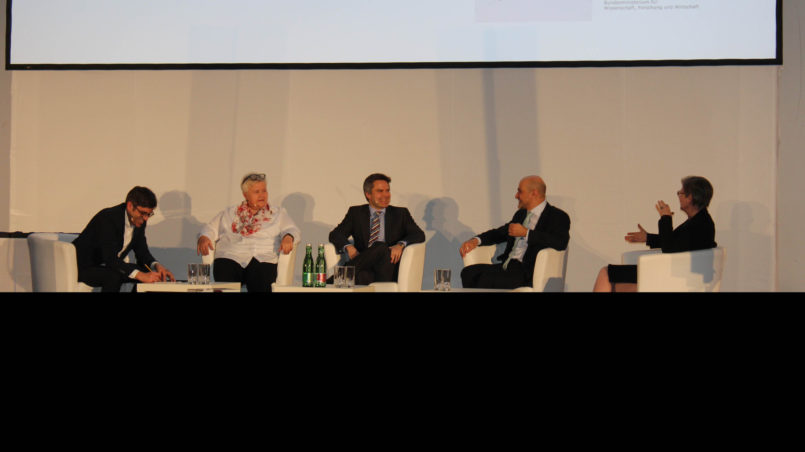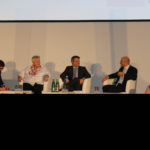How does Science Function Today?

Event data
- Datum
- 20. 2. 2017
- Host
- Bundesministerium für Wissenschaft, Forschung und Wirtschaft
- Location
- Aula der Wissenschaften
- Event-type
- Science Talk - Podiumsdiskussion
- Participants
- Mag. Andreas Jäger, Moderator
- Univ.-Prof. Dr. Ulrike Felt, Universität Wien, Leiterin der Forschungsplattform „Responsible Research and Innovation in Academic Practice“
- Assoz. Prof. Dipl.-Ing. Dr. techn. Clemens Heitzinger, Technische Universität Wien
- Univ.-Prof. Dr. Gregor Weihs, Vize-Präsident des Fonds zur Förderung wissenschaftlicher Forschung (FWF)
- Univ.-Prof. Mag. Dr. Susanne Weigelin-Schwiedrzik, Universität Wien
On 20 February 2017 a Science Talk on the topic, “How does Science Function Today?” took place in the Aula der Wissenschaften. Prof. Ulrike Felt (Professor of Science and Technology Research), Prof. Clemens Heitzinger (Institute for Analysis and Scientific Computing, Technical University Vienna), Prof. Gregor Weihs (Vice-President of the Austrian Science Fund) and Prof. Susanne Weigelin-Schwiedrzik (Professor of Sinology) took part in the podium discussion, led by Andreas Jäger.
What does science need?
Only afterwards do the corresponding necessities, such as financing, come to the fore, in particular due to the fact that the costs of science have increased in the last few years (everything has become more technical) – as well as the structural framework.
Also in the social and natural sciences, paper, book and pencil have not been sufficient for a long time. Due to the large volume of data which has to be processed, these disciplines also require appropriate technical tools. A further significant point is the financing, which has to be correct. If a university wants to acquire the right people, they have to pay an amount which enables a reasonable life beyond science.
Professor Weihs highlighted the fact that especially in psychics, his discipline, very expensive technical equipment is used. For this, the correct infrastructure in particular is vital.
Here, especially the ability to plan can also be named as an important point. Of significance is, in particular, a certain consistency in the financing (the predictability of confirmation for the corresponding applications). On the periphery of science, funding systems have been developed and adapted. This is, of course, dependent on the providers of funds – taxpayers – and the government.
Dual Careers
Prof. Susanne Weigelin-Schwiedrzik considers the promotion and management of so-called ‘dual careers’ as a task of an institution. This is not only a challenge for the scientist and his/her family. She recalls her own past where this was not an issue. The relocation of the whole family (children included) was at this time a purely private matter. A certain organisational talent was very important at this time.
As Vice-Rector for research at the University of Vienna, you have conducted many interviews with such dual career couples. If a particular scientist was very much in demand from the university, his/her spouse was often also offered a position, which means that the institution had to create a post for this partner. This unpredictable process was, however, very often advantageous as the partner was a great gain – only seldom was this very negative for the university. With your husband – an artist – you were very lucky as ultimately he could work everywhere.
Prof. Hitziger reported that dissertations today are completely different compared to a few decades ago. The number of people alone who write a dissertation, a post-doctoral thesis, who are in post-doctoral positions or who are interested in a career in science has increased. The number of posts, however, has remained relatively constant, thereby creating an imbalance. For example if you want to apply in the USA, in many places between 400 and 1.000 well-trained candidates will apply for a scientific post. This, of course, makes the geographical planning of one’s career difficult.
In today’s “tenure track model”, the scientist works from one step to the next step with precise evaluation and exams in between. According to Prof. Heitzinger, this is a fair and transparent system. The universities can clearly state their requirements, which, if fulfilled, lead to a promotion of the scientist. One could ultimately only attract “good” people if they were offered possibilities to develop. The tenure track system enables a better international comparison and is taken very serious by the institutions. One can definitely speak of a competitive model.
A risk investment
Prof. Felt reported that the “classical path” of an academic career is only one of many in order to realize one’s own potentials. This should be transmitted more strongly to young people. In contrast to the USA with its highly selective elite system, we have a more open access to university.
In the social sciences and natural sciences, there are almost no hurdles to access and, as such, it is in principle possible for any willing person to graduate with a doctorate in this sector. As a result, pressure grows for those who wish to remain in science. There is a selection process whereby Prof. Felt sees the necessity of communicating this more clearly. If one decides to go down the scientific path, one must also be prepared to subject oneself to a selection process.
When she was a student, this was not the case at all. The system could, however, also be considered from the opposite perspective, in which scientists are cheap, clever and temporary workers without a chance of a permanent position. The prevailing system can thus either be seen as a system of opportunity or, however, as a cynical system. If you see this in a balanced manner, people are given the chance to attain the qualifications for certain posts, without however being silent on the fact that the system is selective. In addition to the individual qualitative performance, some luck and chance conditions also play a role. Deciding to follow a scientific career always involves a risk investment.
“Whoever sleeps too much at night or drinks too much coffee will fall on their face.”
Laziness or long nights have no place in the prevailing system, according to Prof. Weigelin-Schwiedrzik. Should geniuses be among them, it can only be hoped for these that appropriate people will place their trust in them in the course of their career. A superior – one step up the ladder – is needed who will vouch for these young scientists.
Then they fall on their face. Nevertheless she considers this necessary for the system so that it can function. How many clever heads are lost, remains unknown.
Prof. Heitzinger highlights the fact that, for example, the Schweizer Nationalfonds supports 2/3 of all project applications and that this enables a different manner of work. As such, it is clear to young scientists that, if they have good ideas, there is a realistic chance that these will be implemented by means of appropriate funding. Prof. Heitzinger observes this in contrast to Austria, where the Wissenschaftsfonds evaluates approximately 40% of all submissions for project applications as unworthy of support. Ultimately only approx. 20% of all applications receive support. According to him, better resources would be desired in order to be able to reduce the selectivity in this respect. Further, this would improve the international competitiveness of Austria.
The development of the scientist
Prof. Weis recalls the human errors he made as regards young scientists under his supervision. Inconspicuous people, however, can go through a major development. Prof. Felt agrees with him on this. A learning curve cannot be predicted. Doctoral students can progress just as it is possible that they have already reached their plateau.
The development of certain scientific skills also requires time and she regards an evaluation of these within a doctorate as somewhat premature. Depending on the subject and individual speed, these things (e.g. seeing certain connections or a certain scientific astuteness) need more or less time.
The truly relevant transition in the career of a scientist is that from doctoral to post-doctoral, according to Prof. Weigelin-Schwiedrzik. Whether or not an individual is suitable to be a scientist cannot yet be answered with a doctorate. This transition requires corresponding flexibility from the institution. If one really wants to keep a person, the appropriate framework conditions have to be provided (such as child care and involvement of the spouse).
It has to be made clear to young scientists that they are at the right point in time in the right place in Vienna. With the financial possibilities in Austria, keeping the best scientists of the future at the national universities at this transition, however, requires, much work on the part of the institutions.
To Prof. Felt’s question, Professor Weiglin-Schwiedrzik replied that this refers to the most promising 10%. According to Prof. Felt, a regular post-doctoral student does not negotiate his/her salary. Further, she stresses the significance of available posts and states that she has wished for a particular researcher in vain.
Social Mobility
However, at the University of Stanford, where Prof. Weihs did his post-doc, the students are by far not so diverse but rather can be classified as belonging to the “educationally close” classes. This is in contrast to Canada where he has witnessed a much greater diversity of students. This is also the case in Germany and Austria, Prof. Weihs believes. However Prof. Weigling-Schwiedrzik states that this also varies dependent on the discipline.
Scientists embark rather on a career in the technical and natural sciences subjects – also without the appropriate educational background – ultimately the risk here is not so great. She explains this by reference to the fact that, after an engineering doctorate, it is impossible to remain in science but, due to the numerous alternative career possibilities, this is not necessary.
“More courage”
In his first final question, moderator Mag. Andreas Jäger asked which disciplines the plenum would advise a young person with diverse interests who has a desire to become a scientist. Prof. Felt recommends that young people take their time to make such a decision and to look at all the possible study opportunities. It is better to make this decision by ‘trying out’ than by purely rational decision-making.
In this context, a bachelor – used correctly – is actually to be regarded as a possibility. Prof. Felt speaks of “more courage and less conformity”. However, Prof. Heitzinger would recommend a study course in Austria as there is a variety of high-quality courses on offer. Further, if interest is aroused, one should consider the corresponding offers (science and research groups). Prof. Weihs advises that one should decide on that subject where one “no longer needs coffee breaks”.
As an alternative to the ‘year out’ proposed by Prof. Felt, he suggests appropriate work place programmes, which could be offered for high school pupils, in particular. Prof. Weiglin-Schwiedrzik highlights that, without the appropriate interest, the end could already be in sight for STEOP (Introductory and Orientation Period). She did not interfere at all with the decision of her own three children as regards their choice of study. However, only those who find what “moves them existentially” can find success.
In a second question, moderator, Andreas Jäger, asked those participating in the discussion what they would wish for for their institute from the political decision-makers.
The very informative Science Talk was well received by the audience but, as the “Scientist of the Year” award was presented at the end of the event, it was not possible to take questions from the audience due to lack of time.
Credits
| Image | Title | Author | License |
|---|---|---|---|
 |
How does Science Function Today? | Johanna Bickel | CC BY-SA 4.0 |
